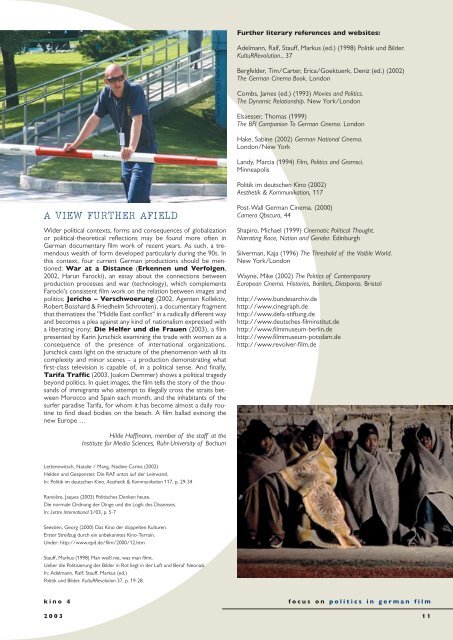Kino - german films
Kino - german films
Kino - german films
Create successful ePaper yourself
Turn your PDF publications into a flip-book with our unique Google optimized e-Paper software.
A VIEW FURTHER AFIELD<br />
Wider political contexts, forms and consequences of globalization<br />
or political-theoretical reflections may be found more often in<br />
German documentary film work of recent years. As such, a tremendous<br />
wealth of form developed particularly during the 90s. In<br />
this context, four current German productions should be mentioned:<br />
War at a Distance (Erkennen und Verfolgen,<br />
2002, Harun Farocki), an essay about the connections between<br />
production processes and war (technology), which complements<br />
Farocki’s consistent film work on the relation between images and<br />
politics; Jericho – Verschwoerung (2002, Agenten Kollektiv,<br />
Robert Bosshard & Friedhelm Schrooten), a documentary fragment<br />
that thematizes the ”Middle East conflict“ in a radically different way<br />
and becomes a plea against any kind of nationalism expressed with<br />
a liberating irony; Die Helfer und die Frauen (2003), a film<br />
presented by Karin Jurschick examining the trade with women as a<br />
consequence of the presence of international organizations.<br />
Jurschick casts light on the structure of the phenomenon with all its<br />
complexity and minor scenes – a production demonstrating what<br />
first-class television is capable of, in a political sense. And finally,<br />
Tarifa Traffic (2003, Joakim Demmer) shows a political tragedy<br />
beyond politics. In quiet images, the film tells the story of the thousands<br />
of immigrants who attempt to illegally cross the straits between<br />
Morocco and Spain each month, and the inhabitants of the<br />
surfer paradise Tarifa, for whom it has become almost a daily routine<br />
to find dead bodies on the beach. A film ballad evincing the<br />
new Europe …<br />
Hilde Hoffmann, member of the staff at the<br />
Institute for Media Sciences, Ruhr-University of Bochum<br />
Lettenewitsch, Natalie / Mang, Nadine-Carina (2002)<br />
Helden und Gespenster. Die RAF untot auf der Leinwand.<br />
In: Politik im deutschen <strong>Kino</strong>. Aesthetik & Kommunikation 117, p. 29-34<br />
Rancière, Jaques (2003) Politisches Denken heute.<br />
Die normale Ordnung der Dinge und die Logik des Dissenses.<br />
In: Lettre International 3/03, p. 5-7<br />
Seesslen, Georg (2000) Das <strong>Kino</strong> der doppelten Kulturen.<br />
Erster Streifzug durch ein unbekanntes <strong>Kino</strong>-Terrain.<br />
Under: http://www.epd.de/film/2000/12.htm<br />
Stauff, Markus (1998) Man weiß nie, was man filmt.<br />
Ueber die Politisierung der Bilder in Rot liegt in der Luft und Beruf Neonazi.<br />
In: Adelmann, Ralf; Stauff, Markus (ed.)<br />
Politik und Bilder. KultuRRevolution 37, p. 19-28.<br />
Scene from ”Die Helfer und die Frauen“<br />
Further literary references and websites:<br />
Adelmann, Ralf, Stauff, Markus (ed.) (1998) Politik und Bilder.<br />
KultuRRevolution., 37<br />
Bergfelder, Tim/Carter, Erica/Goektuerk, Deniz (ed.) (2002)<br />
The German Cinema Book. London<br />
Combs, James (ed.) (1993) Movies and Politics.<br />
The Dynamic Relationship. New York/London<br />
Elsaesser, Thomas (1999)<br />
The BFI Companion To German Cinema. London<br />
Hake, Sabine (2002) German National Cinema.<br />
London/New York<br />
Landy, Marcia (1994) Film, Politics and Gramsci.<br />
Minneapolis<br />
Politik im deutschen <strong>Kino</strong> (2002)<br />
Aesthetik & Kommunikation, 117<br />
Post-Wall German Cinema. (2000)<br />
Camera Qbscura, 44<br />
Shapiro, Michael (1999) Cinematic Political Thought.<br />
Narrating Race, Nation and Gender. Edinburgh<br />
Silverman, Kaja (1996) The Threshold of the Visible World.<br />
New York/London<br />
Wayne, Mike (2002) The Politics of Contemporary<br />
European Cinema. Histories, Borders, Diasporas. Bristol<br />
http://www.bundesarchiv.de<br />
http://www.cinegraph.de<br />
http://www.defa-stiftung.de<br />
http://www.deutsches-filminstitut.de<br />
http://www.filmmuseum-berlin.de<br />
http://www.filmmuseum-potsdam.de<br />
http://www.revolver-film.de<br />
kino 4 focus on politics in <strong>german</strong> film<br />
2003 11<br />
Scene from ”Tarifa Traffic“

















